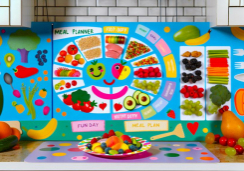Why Choose Budget-Friendly Healthy Meal Plans?
You might think that eating healthily is synonymous with spending a fortune, but that's not necessarily the case. While it's true that organic produce and high-end health foods can be costly, you don't have to break the bank to maintain a nutritious diet. Opting for budget-friendly healthy meal plans allows you to meet both your financial and dietary goals.
By strategically selecting ingredients and embracing smart shopping techniques, you can craft delicious, wholesome meals that won't leave your wallet thin. As you consider the balance between cost and nutrition, remember that the choices you make in the grocery aisle have a profound impact on your health and savings.
Stay tuned to uncover how you can transform your eating habits without sacrificing quality or your budget.
Prioritizing Nutrition Affordability
You can safeguard your wallet and your wellbeing by putting nutrition affordability at the forefront of your meal planning. Budget-friendly meal plans aren't just about cutting costs; they're a strategic way to enjoy healthy meals without straining your finances. By choosing affordable options like seasonal produce and discounted meats, you're able to maintain a healthy diet and save money. Integrating pantry staples such as canned beans and whole grains into your diet provides both nutritional value and cost-effectiveness.
Healthy on a Budget means opting for fresh or frozen fruits and vegetables, which aren't only less expensive than their pre-cut counterparts but also retain most of their nutrients. You'll also avoid the higher food expenses associated with last-minute fast food or takeout by planning ahead. Smart shopping habits such as sticking to your shopping list, taking advantage of grocery delivery for its convenience and to prevent impulse buys, and using cashback credit cards can further reduce costs.
Meal planning isn't just about the food on your plate; it's a holistic approach to managing your health and your budget. By making informed choices, you can enjoy nutritious meals and keep your food expenses in check.
Balancing Cost With Dietary Needs
Balancing your budget with your dietary needs doesn't have to mean compromising on nutrition; by planning meals around store ads and seasonal deals, you'll save money and maintain a balanced diet. You can create meal plans that incorporate healthy foods without breaking the bank.
Whole grains, for instance, are a cost-effective staple that also offer essential nutrients.
Going meatless a few times a week can reduce your grocery bill and improve your health. Beans, lentils, and tofu are cheap (and healthy) sources of protein that can easily replace meat in many recipes. By opting for these alternatives, you'll whip up inexpensive meals that are still packed with the necessary dietary elements.
Be smart about your shopping habits—grocery shopping once a week and adhering to your list helps you stay on track both financially and nutritionally. Batch cooking and freezing extra portions not only cut down on food waste but also save money in the long run.
And remember, choosing low-cost fruits and vegetables that are in season is both budget-friendly and nutritious. You're essentially eating well while keeping your wallet in check.
Streamlining Grocery Shopping Strategies
Having discussed how to incorporate cost-effective and nutritious ingredients into your diet, let's explore how streamlining your grocery shopping strategies can further enhance your ability to eat healthily on a budget. Here are a few tactics:
- Plan Ahead with a Shopping List:
Creating a detailed shopping list based on your meal plan is crucial. It helps you avoid the temptation of impulse buys, which often tend to be less healthy and more expensive. Sticking to your list will save you time in the store and save money at the checkout.
- Make Strategic Choices:
- Look beyond the front displays in the produce section to find the best deals on healthy food.
- Buy discounted meat and divide it into portion sizes before freezing. This won't only save money but also reduce food waste.
- Optimize Food Storage:
Invest in airtight containers to keep your food fresh longer. By properly storing leftovers and batch-cooked meals, you're ensuring that your effort in the kitchen pays off over the week, both financially and time-wise.
Crafting Cost-Effective Menus
By planning your meals around current store specials and discounts, you'll maximize savings while maintaining a nutritious diet. Keep an eye on local ads and in-store deals to pinpoint healthy food that's being offered at a reduced price. When you save money by grocery shopping smartly, you're also more likely to indulge in cooking at home, which is often less expensive than eating out.
Incorporate batch cooking into your routine. Prepare large quantities of meals when ingredients are discounted and freeze them. This approach doesn't just cut costs; it also helps to reduce food waste, ensuring that you use up what you buy while it's still fresh.
Selecting versatile, low-cost produce like onions and potatoes is a game-changer for your wallet. They can be the foundation for a variety of meals, contributing to a great budget without compromising on nutrition. Plus, whole foods like these are typically healthier than processed options.
Embrace affordable protein sources such as canned fish, beans, and eggs. These items aren't only cost-effective but also packed with essential nutrients. To streamline the process, consider using online ordering and curbside pick-up, which can offer exclusive deals and save you time.
Implementing Smart Cooking Habits
Once you've mastered the art of crafting cost-effective menus, it's essential to adopt smart cooking habits that further enhance your savings and health. By integrating a few strategic practices, you can create delicious, quick, and healthy meals while also reducing food waste and saving money.
Here are some tips for eating healthy on a budget:
- Plan Your Meals Wisely: Utilizing meal planning not only saves time but also reduces the temptation of unhealthy fast food options. By planning, you're more likely to cook with what you have, ensuring you consume healthy food and reduce waste.
- Shop Smart: Develop smart shopping habits by grocery shopping once a week, focusing on sales, and sticking to a list. This approach prevents impulse buys and ensures you have all the necessary ingredients for your meal plans. Don't overlook the power of dried herbs and pantry staples, which can be bought in bulk when on sale to save money.
- Cook Creatively: Use budget-friendly ingredients like canned fish or in-season produce to craft healthy meals. Experiment with vegetarian dishes, which can be both nourishing and cost-effective. Remember, leftovers can be repurposed to create delicious new meals, further helping to reduce food waste and keep your budget in check.
Adopting these smart cooking habits can significantly impact your wallet and well-being.
Frequently Asked Questions
Why Is Budgeting Important in Meal Planning?
Budgeting in meal planning fosters financial discipline, ensuring cost control and grocery savings. It promotes nutritional balance, smart shopping, and waste reduction while enhancing cooking skills and meal variety for effective time management.
Why Is Access to Healthy Affordable Food so Important?
Access to healthy, affordable food combats nutrition inequality and is crucial for public health, reducing dietary disparities and economic barriers. Community gardens and education programs can bolster nutrient accessibility and support hunger relief efforts.
Why Is It Important to Have a Healthy Meal Plan?
You need a healthy meal plan for nutrient density, dietary balance, and portion control. It boosts energy levels, improves cooking habits, and enhances flavor variety—all key to meeting health goals and preventing chronic disease.
What Are the Advantages of Food Budget?
You'll save money through smart shopping, bulk buying, and coupon clipping. Seasonal purchases and local sourcing cut costs. Meal prepping, waste reduction, and nutritional balancing are easier, while community gardening offers fresh, affordable produce.
Conclusion
In conclusion, by selecting budget-conscious healthy meal plans, you're investing in your well-being without breaking the bank.
You'll balance nutritional needs with affordability, streamline your shopping, create cost-effective menus, and adopt smart cooking practices.
This approach not only supports your health but also your wallet, ensuring you eat well for less.
Remember, with a little planning and savvy shopping, it's entirely possible to nourish your body economically.










